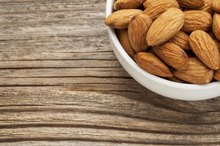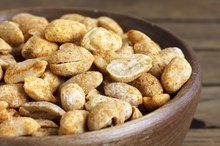What does fact checked mean?
At Healthfully, we strive to deliver objective content that is accurate and up-to-date. Our team periodically reviews articles in order to ensure content quality. The sources cited below consist of evidence from peer-reviewed journals, prominent medical organizations, academic associations, and government data.
- The New England Journal of Medicine: Weight Loss With a Low-Carbohydrate, Mediterranean or Low-Fat Diet
- The New England Journal of Medicine: Weight Loss With a Low-Carbohydrate, Mediterranean or Low-Fat Diet
- Harvard School of Public Health: Expert Answers to Readers' Questions
- Harvard School of Public Health: Fiber
- National Institutes of Health Office of Dietary Supplements: Vitamin B-6
The information contained on this site is for informational purposes only, and should not be used as a substitute for the advice of a professional health care provider. Please check with the appropriate physician regarding health questions and concerns. Although we strive to deliver accurate and up-to-date information, no guarantee to that effect is made.
Peanuts Vs. Pistachios
Although most nuts share some general nutritional characteristics -- they tend to be calorie-dense and high in fat -- different types of nuts have differences, some of which can be significant. While peanuts and pistachios have nutritional profiles that are similar in some ways, the differences between the two nuts may make one more appropriate for your diet than the other.
Calories Concentration
Peanuts and pistachios provide nearly the same amount of calories, with 1 ounce of peanuts containing 161 calories and 1 ounce of pistachios providing 159. These amounts comprise about 8 percent of the daily suggested intake of 2,000 calories. This amount of calories can be burned off by exercise relatively easily; 43 minutes of ballroom dancing or 19 minutes of swimming laps would burn off the calories in 1 ounce of pistachios or peanuts.
Fat Content
Can Almonds Raise Your Cholesterol?
Learn More
Peanuts and pistachios are both high in fat, but they have slightly different amounts. A 1-ounce serving of pistachios contains about 13 grams of fat, while a 1-ounce serving of peanuts has 14 grams of fat. Both contain less than 2 grams of saturated fat per serving. Although eating too much saturated fat may increase your risk of cardiovascular diseases, unsaturated fat is required for optimal health, even if you are dieting. A study in the July 2008 issue of the "The New England Journal of Medicine" found that dieters who restricted fat intake were not as successful as those who restricted carbohydrate intake instead 4.
- Peanuts and pistachios are both high in fat, but they have slightly different amounts.
Protein Content
Protein is a vital nutrient that your body uses to produce and repair tissues, including muscle, so it's important to consume adequate levels for optimal health. Peanuts provide more protein than pistachios, as 1 ounce of peanuts contains 7.3 grams of protein, while 1 ounce of pistachios has 5.8 grams. According to the Harvard School of Public Health, consuming 20 to 25 percent of your calories from protein can be beneficial for weight management and cardiovascular health 56.
- Protein is a vital nutrient that your body uses to produce and repair tissues, including muscle, so it's important to consume adequate levels for optimal health.
- According to the Harvard School of Public Health, consuming 20 to 25 percent of your calories from protein can be beneficial for weight management and cardiovascular health 5.
Carbohydrate Content
Can Certain Nuts Help Lower Your High Blood Pressure?
Learn More
While peanuts and pistachios are both low in carbohydrates, peanuts are significantly lower. A 1-ounce serving of peanuts contains 4.6 grams of carbohydrates, compared to 7.8 grams in a 1-ounce serving of pistachios. Pistachios are also higher in dietary fiber, with 2.9 grams per serving, compared to 2.4 grams in peanuts. Dietary fiber can help you manage your cholesterol levels and promote stable blood-sugar levels.
- While peanuts and pistachios are both low in carbohydrates, peanuts are significantly lower.
- Pistachios are also higher in dietary fiber, with 2.9 grams per serving, compared to 2.4 grams in peanuts.
Vitamin and Mineral Content
Neither peanuts nor pistachios are particularly rich in vitamins, but both provide some vitamin content. Pistachios are particularly high in vitamin B-6, with 0.5 milligrams in a 1-ounce serving, which is nearly 30 percent of the recommended daily intake of 1.5 to 1.7 milligrams for adults. Vitamin B-6 is involved in brain development and immune function, and it also helps protect your body from heart disease, cancer and age-related brain decline. Peanuts are a good source of magnesium, phosphorous and copper, but its greatest contribution to your diet is manganese. A 1-ounce serving of peanuts contains 0.5 milligrams of manganese, which is nearly 25 percent of the 2.3 milligrams recommended for men and the 2.0 milligrams recommended for women. The University of Maryland Medical Center reports that manganese forms connective tissue and aids in metabolism 8. It also helps treat osteoporosis, arthritis, diabetes, epilepsy and premenstrual syndrome.
- Neither peanuts nor pistachios are particularly rich in vitamins, but both provide some vitamin content.
- Pistachios are particularly high in vitamin B-6, with 0.5 milligrams in a 1-ounce serving, which is nearly 30 percent of the recommended daily intake of 1.5 to 1.7 milligrams for adults.
Related Articles
References
- U.S. Department of Agriculture National Nutrient Database: Nuts, Pistachio Nuts, Raw
- U.S. Department of Agriculture National Nutrient Database: Peanuts, All Types, Raw
- Nutristrategy: Calories Burned During Activities, Sports and Exercises Chart
- The New England Journal of Medicine: Weight Loss With a Low-Carbohydrate, Mediterranean or Low-Fat Diet
- Harvard School of Public Health: Expert Answers to Readers' Questions
- Harvard School of Public Health: Fiber
- National Institutes of Health Office of Dietary Supplements: Vitamin B-6
- University of Maryland Medical Center: Manganese
- Pistachio nuts. FoodData Central. U.S. Department of Agriculture. Published April 1, 2019.
- Kendall CW, Josse AR, Esfahani A, Jenkins DJ. The impact of pistachio intake alone or in combination with high-carbohydrate foods on post-prandial glycemia. Eur J Clin Nutr. 2011;65(6):696-702. doi:10.1038/ejcn.2011.12
- Heart health. American Pistachio Growers. 2017.
- All about the protein foods group. U.S. Department of Agriculture. ChooseMyPlate.
- Phytosterols. Linus Pauling Institute. Oregon State University. Updated 2016.
- West SG, Gebauer SK, Kay CD, et al. Diets containing pistachios reduce systolic blood pressure and peripheral vascular responses to stress in adults with dyslipidemia. Hypertension. 2012;60(1):58–63. doi:10.1161/HYPERTENSIONAHA.111.182147
- Castro-Barquero S, Lamuela-Raventós RM, Doménech M, Estruch R. Relationship between Mediterranean dietary polyphenol intake and obesity. Nutrients. 2018;10(10). doi:10.3390/nu10101523
- Feng X, Liu H, Li Z, Carughi A, Ge S. Acute effect of pistachio intake on postprandial glycemic and gut hormone responses in women with gestational diabetes or gestational impaired glucose tolerance: A randomized, controlled, crossover study. Front Nutr. 2019;6:186. doi:10.3389/fnut.2019.00186
- Fadelu T, Zhang S, Niedzwiecki D, et al. Nut consumption and survival in patients with stage III colon cancer: Results from CALGB 89803 (Alliance). J Clin Oncol. 2018;36(11):1112-1120. doi:10.1200/JCO.2017.75.5413
- Ng AL, Leung HH, Kawasaki R, et al. Dietary habits, fatty acids and carotenoid levels are associated with neovascular age-related macular degeneration in Chinese. Nutrients. 2019;11(8). doi:10.3390/nu11081720
- Jackman SR, Witard OC, Philp A, Wallis GA, Baar K, Tipton KD. Branched-chain amino acid ingestion stimulates muscle myofibrillar protein synthesis following resistance exercise in humans. Front Physiol. 2017;8:390. doi:10.3389/fphys.2017.00390
- Dietary Supplements for Exercise and Athletic Performance. National Institutes of Health Office of Dietary Supplements. Fact Sheet for Consumers. Updated: October 4, 2017
- Tree nut allergy. Food Allergy Research & Education. 2020.
- Yates L. Nuts and health. Nutrition Australia. Updated 2014.
- Bruhn C, Harris LJ, Giovanni M, Metz D. Nuts: Safe methods for consumers to handle, store and enjoy. University of California Agriculture and Natural Resources. Published 2010.
Writer Bio
Brian Willett began writing in 2005. He has been published in the "Buffalo News," the "Daytona Times" and "Natural Muscle Magazine." Willett also writes for Bloginity.com and Bodybuilding.com. He is an American Council on Exercise-certified personal trainer and earned a Bachelor of Arts in journalism from the University of North Carolina.









